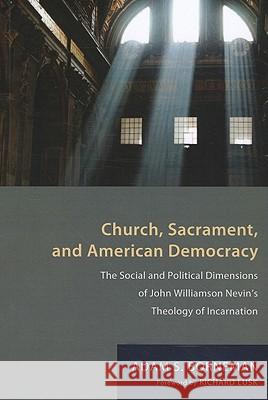Church, Sacrament, and American Democracy » książka
Church, Sacrament, and American Democracy
ISBN-13: 9781608998876 / Angielski / Miękka / 2011 / 202 str.
Church, Sacrament, and American Democracy
ISBN-13: 9781608998876 / Angielski / Miękka / 2011 / 202 str.
(netto: 102,76 VAT: 5%)
Najniższa cena z 30 dni: 106,43
ok. 16-18 dni roboczych.
Darmowa dostawa!
John Williamson Nevin, architect of the nineteenth-century movement, the Mercersburg Theology, has increasingly gained respect as one of the most important theologians of American history and the broader Reformed tradition. Accompanied by the great historian, Philip Schaff, Nevin faced a headwind of American individualism, subjectivism, and sectarianism, but nevertheless forged ahead in articulating a churchly, sacramental theology rooted in the Incarnation of Jesus Christ. Drawing from the well of German Idealism and Romanticism, Nevin proposed a theological hermeneutic that was greatly at odds with the prevailing methods of his day. Nevertheless, Nevin persisted in his efforts, confident that the concepts of organic unity, catholicity, and incarnation offered a vital corrective to the tendencies of the American church and society. Hence, Nevin's theological polemics, while often focused on matters of ecclesiology and sacraments, also have much to offer in the way of a much broader theology of history, mankind, and culture. In this latest contribution to studies in the Mercersburg Theology, Borneman extracts from the Nevin corpus those writings which speak to the predominant social and political trends of the antebellum era, trends which have endured to the present day. Nevin's efforts toward a liturgically-oriented, unified, prophetic church stood over and against many of these trends. Bringing to the fore the implications of Nevin's efforts, Borneman joins a chorus of recent scholars and theologians who insist that Nevin has just as much to say to the church of the present as he did to the church of the nineteenth century. --Borneman's analysis is both political and theologically sophisticated, a rare combination in the scholarly literature on Nevin . . . This is a work that will deeply impact the way historians and theologians understand John Williamson Nevin in the years ahead.-- --Richard Lints Gordon-Conwell Theological Seminary --Nevin challenged many viewpoints that most Americans, including most American theologians, have long taken for granted; Borneman brings that challenge to us afresh in this profound new book.-- --Rich Lusk author of Paedofaith --Borneman has performed a great service by showing the sociopolitical implications of Nevin's overall philosophy and theology even where Nevin himself may not have offered extended treatments.-- --Jonathan G. Bonomo author of Incarnation and Sacrament --Borneman's work provides a valuable contribution to the growing constellation of studies on that most fascinating of nineteenth-century American theologians, John Williamson Nevin.-- --W. Bradford Littlejohn author of The Mercersburg Theology and The Quest for Reformed Catholicity Adam S. Borneman earned his MDiv and ThM at Gordon-Conwell Theological Seminary. He currently serves as pastor of Second Presbyterian Church in Birmingham, Alabama.
John Williamson Nevin, architect of the nineteenth-century movement, the Mercersburg Theology, has increasingly gained respect as one of the most important theologians of American history and the broader Reformed tradition. Accompanied by the great historian, Philip Schaff, Nevin faced a headwind of American individualism, subjectivism, and sectarianism, but nevertheless forged ahead in articulating a churchly, sacramental theology rooted in the Incarnation of Jesus Christ. Drawing from the well of German Idealism and Romanticism, Nevin proposed a theological hermeneutic that was greatly at odds with the prevailing methods of his day. Nevertheless, Nevin persisted in his efforts, confident that the concepts of organic unity, catholicity, and incarnation offered a vital corrective to the tendencies of the American church and society. Hence, Nevins theological polemics, while often focused on matters of ecclesiology and sacraments, also have much to offer in the way of a much broader theology of history, mankind, and culture. In this latest contribution to studies in the Mercersburg Theology, Borneman extracts from the Nevin corpus those writings which speak to the predominant social and political trends of the antebellum era, trends which have endured to the present day. Nevins efforts toward a liturgically-oriented, unified, prophetic church stood over and against many of these trends. Bringing to the fore the implications of Nevins efforts, Borneman joins a chorus of recent scholars and theologians who insist that Nevin has just as much to say to the church of the present as he did to the church of the nineteenth century.""Bornemans analysis is both political and theologically sophisticated, a rare combination in the scholarly literature on Nevin . . . This is a work that will deeply impact the way historians and theologians understand John Williamson Nevin in the years ahead.""--Richard LintsGordon-Conwell Theological Seminary""Nevin challenged many viewpoints that most Americans, including most American theologians, have long taken for granted; Borneman brings that challenge to us afresh in this profound new book.""--Rich Luskauthor of Paedofaith""Borneman has performed a great service by showing the sociopolitical implications of Nevins overall philosophy and theology even where Nevin himself may not have offered extended treatments.""--Jonathan G. Bonomoauthor of Incarnation and Sacrament""Bornemans work provides a valuable contribution to the growing constellation of studies on that most fascinating of nineteenth-century American theologians, John Williamson Nevin.""--W. Bradford Littlejohnauthor of The Mercersburg Theology and The Quest for Reformed CatholicityAdam S. Borneman earned his MDiv and ThM at Gordon-Conwell Theological Seminary. He currently serves as pastor of Second Presbyterian Church in Birmingham, Alabama.











